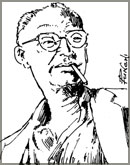The ‘egghead’ who married the ‘hourglass’
by Carl Muller
This year, at 89, the man who was regarded as a giant of the American
theatre, died. He was Arthur Miller, the US playwright who wrote Death
of a Salesman and who believed that a playwright’s job was to challenge
systems and change the world.

Miller was born in New York in 1915 and grew up in Harlem. The Wall
Street crash forced the family to Brooklyn where the young Arthur made
$4-a-week delivering bread.
“It was hard to know where my own family situation left off and where
society began,” he later wrote, “it was all happening right there in the
living room.” Disillusioned at the break-up of the American Dream, he
embraced Socialism, read The Brothers Karamazov and realised that his
only ambition was to write.
His plays were personal, moral, and his characters were based on
people he had known. He drew from events in his own life: his
adolescence, the Depression, his opposition to anti-Communist witch
hunts and his ill-fated marriage to Marilyn Monroe.
His Socialist convictions were honed when he found work in the
Brooklyn Naval Dockyard - a hotbed of Labour radicalism. He wrote all
the while, married Mary Slattery and supported his wife and two children
by writing radio plays. The Man who had All the Luck was produced on
Broadway.
The next, All My Sons - about a businessman who allows defective
parts to be fitted to aeroplanes and causes fatal crashes - won the New
York Drama Critics’ Circle Award, beating Eugene O’Neill’s The Iceman
Cometh.
In Death of a Salesman Miller brought in the same themes - damage
caused by materialistic values and family fragmentation. It featured his
best-known character, Willy Loman, the American Dream proponent who
realises, in late middle age, that he worth more dead than alive! It was
Death of a Salesman that made Miller famous.
As the director of the play, Elia Kazan, said: “Art does an
extraordinary thing here. (Miller) shows us a man who represents
everything (that Miller) believes to be misguided about the system we
live in; then goes on to make us feel affection and concern and even
love for this man. He is ridiculous and tragic all at once.” The play
was decidedly anti-capitalist and it brought Miller to the attention of
Washington.
He then gave us The Crucible - a play about the witch hunts and
hysteria that had swept through Salem in the 17th century. The text of
this play has sold over seven million copies and has become the most
performed of his plays; but he was accused of un-American activities by
the government.
In the midst of all this, and after having asked his first wife for a
divorce, he married Marilyn Monroe in 1956. Author Norman Mailer
commented: “(The union brought together) the great American Mind (and)
the great American Body,” and the magazines carolled: “Egghead weds
Hourglass.” But it was a true love match.
In 1987, he wrote: “(Marilyn was) almost ludicrously provocative, a
strange bird in her aviary, if only because her tight dress was so
blatantly tight, declaring rather than insinuating that she had brought
her body along and that it was the best one in the room.”
The marriage, however, proved a disaster, as Marilyn battled
depression and drug addiction. They divorced after five years and Arthur
married a photographer, Inge Morath, in 1962 - the same year Marilyn
killed herself. But Miller began to slide.
His next play, After the Fall was ill-received because one of its
characters, an over-medicated, emotionally abusive seductress who takes
a fatal overdose, was seen as Marilyn, and he was accused of
sensationalism and exploitation. Even the play that followed was panned
by the critics who had become hostile to his moralising tone. Author
Gore Vidal told him bluntly: “Stop telling us what we already know!”
But every one of his plays was enthusiastically received in England
and Miller became a frequent visitor to London. After Morath died in
2002, Miller began seeing artist Agnes Bailey, 55 years younger than he
was. When asked about his new affair, he said: “I like the company of
women. Life is boring without them.”
Fitting words for his epitaph!
..................................
<< Artscope
Main Page |
